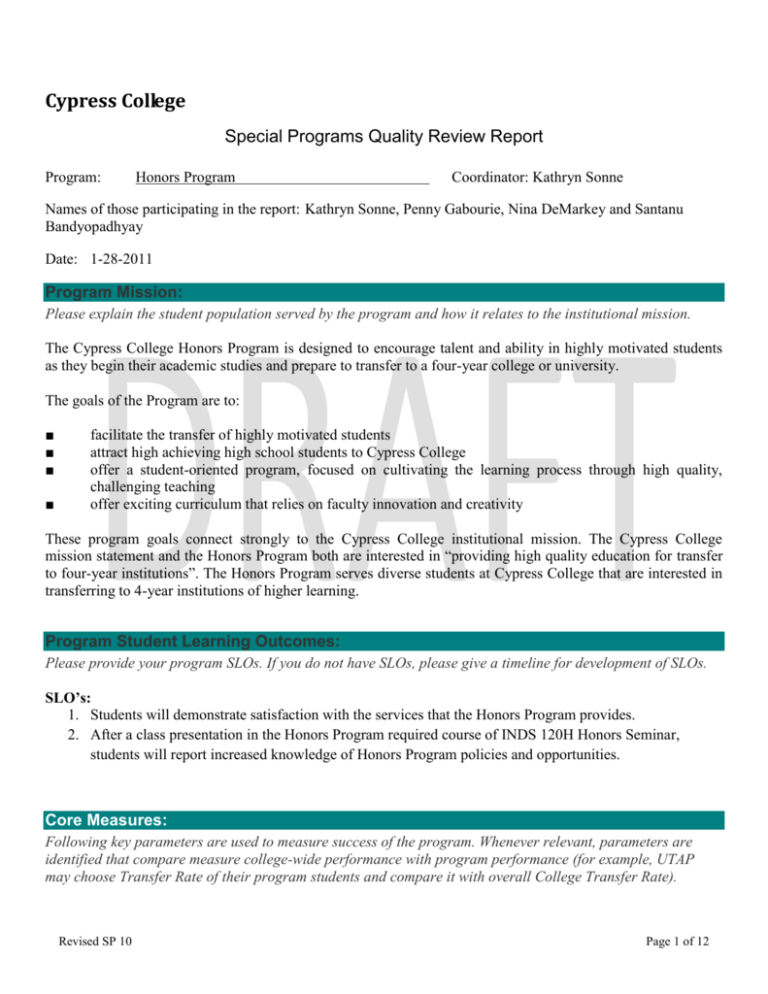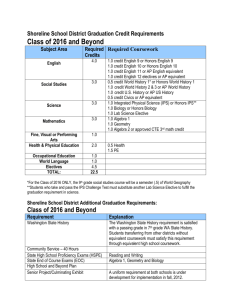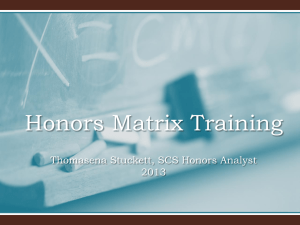Honors - Cypress College
advertisement

Cypress College Special Programs Quality Review Report Program: Honors Program Coordinator: Kathryn Sonne Names of those participating in the report: Kathryn Sonne, Penny Gabourie, Nina DeMarkey and Santanu Bandyopadhyay Date: 1-28-2011 Program Mission: Please explain the student population served by the program and how it relates to the institutional mission. The Cypress College Honors Program is designed to encourage talent and ability in highly motivated students as they begin their academic studies and prepare to transfer to a four-year college or university. The goals of the Program are to: ■ ■ ■ ■ facilitate the transfer of highly motivated students attract high achieving high school students to Cypress College offer a student-oriented program, focused on cultivating the learning process through high quality, challenging teaching offer exciting curriculum that relies on faculty innovation and creativity These program goals connect strongly to the Cypress College institutional mission. The Cypress College mission statement and the Honors Program both are interested in “providing high quality education for transfer to four-year institutions”. The Honors Program serves diverse students at Cypress College that are interested in transferring to 4-year institutions of higher learning. Program Student Learning Outcomes: Please provide your program SLOs. If you do not have SLOs, please give a timeline for development of SLOs. SLO’s: 1. Students will demonstrate satisfaction with the services that the Honors Program provides. 2. After a class presentation in the Honors Program required course of INDS 120H Honors Seminar, students will report increased knowledge of Honors Program policies and opportunities. Core Measures: Following key parameters are used to measure success of the program. Whenever relevant, parameters are identified that compare measure college-wide performance with program performance (for example, UTAP may choose Transfer Rate of their program students and compare it with overall College Transfer Rate). Revised SP 10 Page 1 of 12 Measures2 Active Alumni Unduplicated students Enrollments Retention Rates Success Rates Transfer-Level English Transfer-Level Math Both Math & English Transferred to university1 Persistence from semester 1 to 2 Persistence from semester 2 to 3 Other: Average # of Honors Courses 20 49 86% 84% 16 18 14 0% 100% 95% 21 82 95% 95% 20 14 13 76% 95% 57% 2.0 1.8 Unduplicated students Enrollments Retention Rates Success Rates Transfer-Level English Transfer-Level Math Both Math & English Persistence from semester 1 to 2 Persistence from semester 2 to 3 Other: Average # of Honors Courses 24 81 91% 86% 19 17 15 92% 92% 2 28 93% 86% 1 0 0 50% -- 1.7 1.8 Inactive Fall 2008 0 2 100% 100% 0 0 0 36% --1.0 Fall 2009 2 2 50% 50% 2 2 2 50% 50% 1.0 Comparison 62 79 80% 61% 36 18 14 51% 71% 53% 62 80 86% 69% 31 19 13 73% 57% Active Alumni Inactive Comparison 16 61 97% 97% 14 9 9 Spring 2009 6 2 78 3 97% 100% 96% 67% 6 1 5 0 5 0 37 59 75% 68% 27 10 9 88% 94% 100% 100% 70% 60% 1.9 1.8 --- 18 89 94% 90% 15 8 7 89% 1.0 Spring 2010 1 0 28 0 96% -93% -0 0 1 0 0 0 --- 1.6 2.0 58 89 85% 85% 31 17 12 57% -- Transfer data are from students who took an Honors course in Fall 2007. They were tracked until Fall 2010 to identify whether they transferred to a four-year university in that time. From the available data, there were 6 active Honors program students, 46 Honors alumni, 11 inactive Honors program students, and 51 students who were not involved in the Honors program. 2 The measures of active, alumni, inactive and comparison reflect the status of the student as of fall 2010. The data as presented are confusing. They do not accurately reflect the participation in the Honors Program. First the measures of active, alumni, and inactive students are the designated status of the students as of fall 2010 not in the semesters represented above. Active students are those who have been accepted into the Honors Program who were enrolled in Cypress College in fall 2010. Alumni are students who have completed the Honors Program requirements and were no longer enrolled in Cypress during fall 2010. Finally, the inactive students are students who were accepted into the Honors Program but did not complete the requirements and were not enrolled in Cypress during fall 2010. Therefore, the students designated as alumni and/or inactive were most likely active students in some of the previous semesters and the many of the active students may not have been enrolled at all during those semesters. The comparison group consists of students enrolled in Honors courses that are not members of the Honors Program. As presented the numbers are misleading. They are only measuring those students who were actually enrolled in an Honors class during a particular semester. The Honors Program consists of much more than the number of students enrolled in Honors classes. Students participate in the Honors Program on various levels. Some students finish the Program requirements of 18 units in Honors Courses within 2 semesters. While they continue to be enrolled in Cypress College and participate in the Honors Program activities, the Honors Club Revised SP 10 Page 2 of 12 and service learning, they are no longer taking Honors classes and therefore are not represented in the above figures. Students who apply for and are accepted into the Honors Program during or after registration may not have any Honors classes their first semester of participation. The following chart depicts the number of students who were accepted by the Honors Program and were enrolled in Cypress College during the semesters listed above. Fall 2008 136 Spring 2009 152 Fall 2009 134 Spring 2010 130 Also students often try an Honors course and later apply for the Program. Finally, the philosophy of the Honors Program (voted by PAC) is to be inclusive rather than exclusive so the Honors classes are not restricted to Honors Program students but are open to all interested students who meet the course prerequisite. At least some of the data are inaccurate. For example, the data shows that there were only 19 unduplicated Honors Program students enrolled in Honors classes during spring 2010. However, a comparison of the Honors class rosters with the Program data base showed that actually there were 70 unduplicated students enrolled in Honors classes during that semester. Please see Appendix A for a list of these students and their classes. This finding throws suspect on the numbers from the other semesters. The data also do not take into consideration the number of Honors courses that are offered in a given semester. For example, fall 2008 we offered 11 courses, spring 2009 we offered 12 courses, but for fall 2009 and spring 2010 only 10 Honors courses were offered each semester. This limits the number of Honors students that are able to enroll in these semesters. As a result the overall numbers for these semesters are lower due to a more limited availability of classes. Finally, the Honors Program has experienced record growth this year as the following charts will show. New Honors Students 2008-2009 39 1. 2009-2010 27 2010-2011 811 2009-2010 134 2010-2011 191 As of Feb 1, 2011. Total # of Honors Program Students 2008-2009 152 The Honors Program accepts applications continuously, so we can expect the 2010-2011 numbers to continue to grow. In addition, as opportunities for freshman admissions at the California public universities continue to lessen; this trend is likely to continue for several years. The current number of courses offered will not be able to serve the increased number of Honors students that we are trying to serve while maintaining on open course policy and not offering priority registration to Honors students. Thus, the data that shows numbers of students in Honors courses does not reflect the number of active students in the program. Budget Trends: Provide trend information regarding the allocated budget / actual expenditures for the past several years of the program. Note any special circumstances below the table. The information in this chart will be used in the following two sections. Please mention reassigned time allocated towards the program. If any resource is Revised SP 10 Page 3 of 12 shared, mention the proportion allocated to the program, for example, if an administrative assistant works 20% for the program, please clarify it. Allocated Actual Expenditures 2007-2008 $28,391.00 $26,574.00 2008-2009 $28,027.00 $26,861.00 2009-2010 $23,086.00 $22,532.00 These figures do not accurately reflect the history of the Honors Program budget. When the program was created by PAC in 1997 it had a budget of $20,200. This included $10,000 for the director’s reassigned time so the actual operating budget for the program was $12,200. During the budget problems of 2003/2004 the operating budget was cut 31%. In 2004/2005 the operating budget was cut an additional 6%. Currently, that figure has been reduced to $3,161.00 as an operating budget. This figure is intended to cover student field trips, faculty materials, travel expense, dues for three organizations, supplies and other operating expense such as sharing the cost of the copy machine located in the Transfer Center. This amount has become woefully inadequate to offer and maintain the quality of the Honors Program. As addressed in the proposed Goal III a partial restoration of the budget would include $1500.00 to be used for Honors course faculty directed field trips and course supplies and $2000.00 to be utilized for faculty and possibly student attendance at the annual National Collegiate Honors Council Conference. This conference assists in program development and networking opportunities. Review Previous Goals and Objectives Please describe if the goals and objectives identified in the previous review were met or not. Please provide explanations if the goals were not met. The information in the two tables above, or other information, may be used as evidence. Previous Goals and Objectives: Goal: Improve the function and professionalism of the Honors Office Objective: Hire a 100% clerical assistant I to be shared 50% with Service Learning. 1.1. Person(s) responsible: Director and Dean 1.2. Timeframe: By the end of fiscal year 2009/2010 1.3. Fiscal resources needed (if not applicable, indicate “NA”): $20,000 This goal was not met due to lack of fiscal resources. Numerous official clerical requests were submitted but denied due to lack of prioritization. Currently the clerical needs are being met by the Social Science Division and work study student workers. Goal: Increase family involvement. Objective: Institute a Family night to introduce the family members of the Honors students to the Program requirements. Objective: Create a family handbook This goal was not met due to lack of interest from Honors students. In retrospect, this goal diminished the goal of increasing and encouraging the independence of Honors students as they prepare to transfer. Instead the goal was altered to include families and student support people in our Honors Program Banquet and Awards Night. This offered students an opportunity to share the success of their independence and responsibility. Revised SP 10 Page 4 of 12 Goal: Increase Honors Program faculty training and evaluation. Objective: Create faculty handbook. Objective: Conduct faculty evaluations. This goal was successfully met. Narrative: Strengths and challenges. Please base this section on the two charts above, in addition to program-specific evidence. Strengths: Use this section to briefly reflect upon major accomplishments of the program. The narrative should discuss the implications related to the core measures and compare program performance parameters with overall college parameters (whenever possible). The Cypress College Honors Program is a member of the Honors Transfer Council of California (HTCC) which affords many benefits and privileges for our students. Primary among them are transfer agreements that give priority consideration for admission to universities such as UCLA, UCI, Chapman University, and Pitzer College. Students also have the opportunity to attend and present papers at the annual HTCC Student Research Conference sponsored by UCI. Approximately 25 students attend each year. On average, Cypress College has three to four student presentations that are chosen each year (5 students will be presenting at the 2011 conference) and published in a UCI publication of conference abstracts. Participants in the Honors Program also are eligible to apply for HTCC and university scholarships that are only available to Honors Program students. For example, several Cypress students have received the prestigious UC Regents Scholarship, the Wasserman and McNair Scholarships at UCLA. Spring 2009, Cypress College hosted the Honors evaluation site visit from UCLA. As a result of the visit Cypress College remains a member of the Transfer Alliance Program (TAP) in “good standing”. The visit required an extensive self study that was submitted to the site visit committee and followed up with a day-long site visit. The visit included having the team meet separately with the director, counselor, executive vicepresident, dean, president, advisory committee, honors faculty, and a lunch/discussion with Honors students. The site team gave extensive favorable feedback, “the Cypress College Honors Program benefits from a dedicated team of administrators and faculty. The team’s laudable level of commitment largely accounts for many of the enriching opportunities available to students despite modest program resources. Also distinguishing the honors program at Cypress College are the students themselves, who function as a tightly-knit and extremely motivated group” (UCLA Site Team). The Cypress College Honors Program was designed as separate sections of seminar style courses with a limit of 20 students in each class. This configuration supports close academic and social interaction with other highly motivated students and faculty. The courses are primarily general education and student development courses. There are Honors sections of classes available in all areas of the Intersegmental General Education Transfer Curriculum (IGETC) except the Math department. The courses are open to all students who meet the stated prerequisites. Counselors encourage students to take Honors courses in their major area even if they do not choose to join the Honors Program. The college offers between 10 and 12 Honors sections each semester. The number of classes offered depends largely on the academic divisions and the instructors. The Honors Director provides a suggested class list to the divisions, but the final decision is made at the division level. Several required courses are offered each semester. The rest of the courses are rotated to increase the variety of courses available to the students. The Honors courses are enhanced to include more depth or breadth of information and typically require more reading, writing and critical thinking. Although the courses are more challenging than non-Honors sections, the success rate is considerably higher than the college-wide success rate (see chart below). Revised SP 10 Page 5 of 12 Student Success Rate* Honors Classes College-wide** Fall 2008 79.8% 66.0% Spring 2009 87.6% 66.3% Fall 2009 88.8% 69.1% Spring 2010 88.2% 68.2% * Success rate is defined as the number of students who earn an A, B, C or Cr grade. ** College-wide data extracted from the Cypress College Success and Retention Report Fall 2009 and Fall 2010 Student Retention Rate* Fall 2008 Honors Classes 87.4% College-wide** 80.8% Spring 2009 90.5% 80.7% Fall 2009 88.8% 83.7% Spring 2010 90.4% 82% ** College-wide data extracted from the Cypress College Success and Retention Report Fall 2009 and Fall 2010 Cypress College students who complete the Honors Program requirements enjoy an unusually high acceptance rate to universities. For example, the acceptance rate for UCLA is approximately 40% for the average campus population. In contrast, the acceptance rate for Honors students averages 87% to 92%. Cypress Honors students have also been accepted to many other prestigious universities such as UC Berkeley, UCI, USC, Columbia University and University of Pennsylvania Wharton School of Business, MIT and Notre Dame University in addition to many California State Universities and independent colleges and universities in California. Each year several Honors Program students are nominated for Outstanding Graduate of the Year and several have been selected. Cypress College students are great leaders. They begin this process by taking on leadership opportunities in the Honors Club. Many of them excel and go on to lead the campus in Associated Students. The last three AS Presidents have come from the Honors Club – two were presidents of the club prior to serving in AS. Leadership is a key element on transfer applications and those opportunities are being offered to our Honors students with tremendous success. The Honors Program represents a significant investment by the campus. In return, the Honors Program students make a significant contribution to the campus and community. In the 2009-2010 academic year, Honors Program students volunteered 1,249 hours in service to such organizations as the Orange County Food Bank, the Orange County Registrar’s Office, Habitat for Humanity, Seal Beach Naval Weapons Station Natural Refuge, The Department of National Parks, Orange County Animal Care, Cesar Chavez Foundation, Paint Your Heart Out as well as on-campus tutoring, Kindercaminata and Senior Day. Service Learning components are also available in many of the Honors courses. Students are also well represented in campus organizations such as Associated Students, Student Activities, Alpha Gamma Sigma, the Chronicle, and campus committees. In addition, several Honors students work as Supplemental Instruction (SI) facilitators. The Honors Program students are often called upon to represent Cypress College at campus and community functions. For example, they have been speakers at Opening Day, Americana and community organizations such as the Key and Exchange Club. Students also continue to participate in the district Study Abroad Program which continues to offer Honors versions of the courses in order to facilitate the participation of Honors students. Revised SP 10 Page 6 of 12 Challenges: Please provide any insight into significant challenges or obstacles that may have curtailed the success of the program. Identify the types of changes necessary for improvement. Budget cuts prevent us from providing faculty with funds to purchase materials to enhance their courses and provide field trip opportunities that have been a standard in past years. The cuts have also prevented attendance at professional conferences that provide innovative ideas for improving the program – many of which have been successfully incorporated into the program - contacts with transfer institutions, and the opportunity to serve on national and regional boards due to travel requirements. Budget constraints have also prevented the incorporation of Phi Theta Kappa - an international honor society that is often associated with Honors Programs. The Honors Program has long recognized the benefits of establishing a Phi Theta Kappa Chapter at Cypress College; however, it involves a significant time and budget commitment. Therefore, we have declined to participate. With additional release time, we could open up this opportunity to Cypress students which would increase access to scholarships. Lack of math courses in the honors curriculum has also been an obstacle. This presents a challenge to students in science, math and engineering majors as it is very difficult to meet their major requirements while completing the program. We have also had a lack of representation from SEM on our advisory board. We will continue to meet with SEM Dean and Department Coordinators to rectify this issue. We are also pursuing the development of an Honors PSY/SOC 161 C which will be another Honors option that meets the general education math requirement for our students that would not require cooperation from the SEM division. Lack of priority registration is a challenge for the Honors students. Because Honors courses are open to the entire campus – the courses often cannot accommodate the needs of the Honors Program students. The limited number of courses at specific times is a difficult puzzle for students to manage as they try to complete Honors requirements as well as IGETC and major requirements. The students are very motivated and are attempting to transfer on the fast track – which is often impossible due to access to necessary courses. In the 2010 Honors Transfer Council of California (HTCC) poll - 57% of community colleges with Honors Programs offered priority registration to Honors Program students. Spring 2009, Cypress College hosted the Honors evaluation site visit from UCLA. Although the site team gave extensive favorable feedback – they also issued a list of recommendations. Fulfilling these recommendations is in the best interest of Cypress College due to the transfer agreement between Cypress College and UCLA that could be at risk. A two-year evaluation of the recommendations will occur during the summer of 2012. So far, the program has successfully responded to many of the suggestions such as increased connections with EOPS and DSPS, Phi Theta Kappa research, regularly scheduled meetings with dean, clerical support through division office in place, Honors web page updated, faculty handbook completed and Flex workshop for Honors faculty approved, and on campus recruitment increased through faculty recommendation letters and visits to UTAP, Puente, and Legacy programs. Many of the other suggestions were budget related and appear in the goals of this document. Long-range Plan and Objectives In the following section, identify general goals and specific, measurable objectives your area plans to achieve within the next three years. Programs should identify 3-5 goals, with at least one goal per year. Goals set for Revised SP 10 Page 7 of 12 next year that require fiscal resources must also be submitted as a Budget Request and Action Plan (separate form). Identify if the goal is aligned with any of the following plans (provide details): Educational Master Plan, Student Services Plan, Matriculation Plan, Distance Education Plan, Student Equity Plan, Technology Plan, Basic Skills Plan I. Goal: Increase outreach to high school students, students placing below ENGL 100, DSPS students and coordinated activities with Puente, Legacy, UTAP students. Supports plan: Strategic Plan: Direction Four, Goal 1; Strategic Plan: Direction Five, Goal 3 1. 2. Objective: Create a recruitment video for high school visits, on campus events and for the web site. 1.1. Person(s) responsible: Director 1.2. Timeframe: Spring 2012 1.3. Fiscal resources needed (if not applicable, indicate “NA”): NA Objective: Collaborate with Disabled Students and sponsor an event during Disabilities Awareness Month 2.1. Person(s) responsible: Director 2.2. Timeframe: Fall 2011 2.3. Fiscal resources needed (if not applicable, indicate “NA”): $200.00 3. Objective: Coordinate activities with Puente, Legacy, and UTAP students in order to share program resources and recruit students that are completing their program into the Honors Program. II. 3.1 Person(s) responsible: Director and Counselor 3.2 Timeframe: Spring 2011 – Fall 2012 3.3 Fiscal resources needed (if not applicable, indicate “NA”): $300.00 Goal: Explore new curriculum and contract courses for math and science and engineering students and expand the number of Honors sections offered each semester. Supports plan: Strategic Plan: Direction One, Goal 2; Student Equity Plan: Course Completion (Retention), Transfer; Objective 1.1.___________________________________ 1. Objective: MATH 115 - stand alone course MATH 150A and MATH 150B - as contract courses BIO 111, 112, 113 and 114 - as contract courses CHEM 111A and 111B - as contract courses PSY/SOC 161C – stand alone course 1.1. Person(s) responsible: Director and Dean 1.2. Timeframe: Fall 2011-Spring 2014 1.3. Fiscal resources needed (if not applicable, indicate “NA”): NA 2. Objective: Increase number of Honors courses offered each semester to accommodate the explosive growth of the Honors Program. Revised SP 10 Page 8 of 12 III. 2.1 Person(s) responsible: Director and Dean 2.2 Timeframe: Spring 2012 + 2.3 Fiscal resources needed (if not applicable, indicate “NA”): NA Goal: Increase budget from 3,161.00 to 6,61.00 Supports plan: Strategic Plan: Direction Five, Goal 2 1. 2. Objective: Make funds available for Honors course field trips and course supplies 1.1. Person(s) responsible: Director and Dean 1.2. Timeframe: Fall 2011 1.3. Fiscal resources needed (if not applicable, indicate “NA”): 1500.00 Objective: Make funds available for faculty and student attendance at National Collegiate Honors Council Conference 2.1. Person(s) responsible: Director and Dean 2.2. Timeframe: Fall 2012 2.3. Fiscal resources needed (if not applicable, indicate “NA”): 2,000.00 IV. Goal: Establish Priority Registration for Honors Program students Supports plan: Student Equity Plan: Transfer 1:1, Course Completion 1:2; Strategic Plan: Direction One, Goal 4.1 and Goal 5 1. Objective: Take priority registration proposal to Academic Senate 1.1. Person(s) responsible: Director and Dean 1.2. Timeframe: Fall 2011 1.3. Fiscal resources needed (if not applicable, indicate “NA”): NA Use the above outline format to add additional goals or objectives as necessary. Reviewed by President/EVP/VP/Dean/Director/Manager Reviewer’s comments Dean, Social Science Division: The Honors Program Director and Counselor have created an excellent Honors Program with an excellent service learning component for our students. I realized last year that over the last 6 years, I have not devoted the time to work with the Honors Program Director and Counselor that I should have, and I let them know this and that I would be making a monthly commitment to meet and try to be available whenever they need my assistance. I believe it has been very productive for us, the program and our students. We work very well together. In truth, they do all the work, and I just provide a little guidance. We have spent time analyzing and reviewing what we’re doing well and where we can continue to improve. They have done an excellent job of quickly implementing suggestions given during the recent UCLA TAP review, and their goals reflect continued focus and efforts to address other goals/issues as needed. My observation is that the Revised SP 10 Page 9 of 12 Program has been organized and well run and provides many events and educational opportunities for our students; however, they have could have done a better job of communicating the many good things they’ve been doing for years to administration, faculty, and students. Efforts in this area have been increased (with more to come), and I am hearing that they are working. The monthly newsletter is excellent at keeping everyone informed. I am concerned about the continued confusion on how to account for how many students the program actually serves, how many Honors students are actually enrolled in Honors classes, and what financial resources the program needs to be successful. I hope that this can be cleared up very soon. Reminder: If fiscal resources are needed for next year’s goals, submit a separate Budget Request and Action Plan for budget unit review. Appendix A Unduplicated Count of Honors Students Enrolled in Honors Classes Spring 2010 Last Ahmed Akbar Akpan Angus Arroyo Atangan Billings Bousema Burns Chavez Chen Cho Cochran Corona Dang Dimayuga Ellorin Gahr Galicia Garcia Gharalbeh Gonzalez Gutierrez Han Revised SP 10 First Hira Fahima Emem Sara Ericka Andrew Ryan Charlene Alexander Anthony Allen Bo Evan Felisha Tiffany Lawrence Channel Desiree Jessica Estella Nadine Jessica Anani Joanna Student ID @01228068 @01190975 @00623131 @01137665 @01264800 @01203101 @01183519 @01246767 @01224262 @01256508 @01274563 @01153065 @01198970 @01199166 @00336583 @01203264 @01254880 @01190083 @01164610 @01162743 @00909233 @01151620 @01252958 @00658069 Class INDS 120HC INDS 120HC ENGL 104HC INDS 120HC INDS 120HC COUN 135HC MUS 118HC COUN 160HC COUN 160HC ENGL 100HC ECON 105HC ECON 105HC COUN 160HC ENGL 104HC ASTR 116HC ASTR 116HC ASTR 116HC ECON 105HC ASTR 116HC ECON 105HC ENGL 100HC ENGL 104HC INDS 120HC ENGL 100HC CRN # 21325 21325 20956 21325 21325 23090 20878 23307 23307 20930 22992 22992 23307 20956 23298 23298 23298 22992 23298 22992 20930 20956 21325 20930 Page 10 of 12 Heo Hernandez Herwees Higginbotham Javier Khan Khieu Kim Kim Lee Li Lopez Lunde Luong Madrigal Min Mogilevsky Moya Otero Pan Park Peng Peralta Peters Rahimi Rojas Ross Rubio Saradeth Saw Schad Selassie Shakeri Song Sterger Talley Torrico Torrico Vankatesh Vo Wahid Wasko Witham Wong Yin Revised SP 10 David Karina Tasbeeh Rebecca Edward Kasem Jason A Ran Jenny Yichen YiYing Appollonia Erik Tam-Dan Jesus Andy Arthur Daniel Luis Shaun Daniel Wei-Sheng Matthew Matthew Sarah Moises Tammy Gabriel Robinson Ryan Christopher Nicole Danial Ji-Eun Leah Jonathan Fiorella Luis Arthy Brian Altaf Taylor April Cindy Lucas @01259298 @01216522 @01219556 @01163977 @01197990 @01215112 @01169412 @01214144 @01250060 @01182259 @01194853 @00838715 @01230146 @01269793 @01203748 @01211646 @00541183 @01204029 @01252217 @00537601 @01156419 @01144197 @01082313 @01211967 @01257409 @01209860 @01276228 @01241019 @01154440 @00578920 @01165549 @00991773 @01205570 @00626579 @01201290 @00963769 @01154475 @01265558 @01199128 @01196817 @01143934 @01230135 @01077048 @01263654 @01217765 ENGL 100HC MUS 118HC ASTR 116HC ECON 105HC COUN 135HC SOC 101 HC COUN 160HC COUN 160HC ENGL 104HC ECON 105HC ENGL 104HC COUN 135HC COUN 160HC ASTR 116HC COUN 160HC ENGL 104HC INDS 120HC INDS 120HC COUN 135HC ENGL 104HC INDS 120HC COUN 135HC INDS 120HC ENGL 104HC ENGL 100HC ASTR 116HC SOC 101 HC COUN 160HC INDS 120HC ENGL 100HC COUN 160HC ENGL 104HC ENGL 104HC ECON 105HC COUN 160HC INDS 120HC SOC 101 HC ENGL 104HC ASTR 116HC COUN 135HC SOC 101 HC COUN 135HC INDS 120HC ENGL 104HC INDS 120HC 20930 20878 23298 22992 23090 23917 23307 23307 20956 22992 20956 23090 23307 23298 23307 20956 21325 21325 23090 20956 21325 23090 21325 20956 20930 23298 23917 23307 21325 20930 23307 20956 20956 22992 23307 21325 23917 20956 23298 23090 23917 23090 21325 20956 21325 Page 11 of 12 Yoo Zarate Revised SP 10 Min-Young Manuel @01214721 @01196826 ECON 105HC ENGL 104HC 22992 20956 Page 12 of 12







